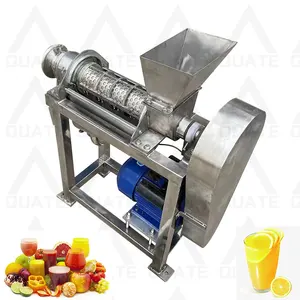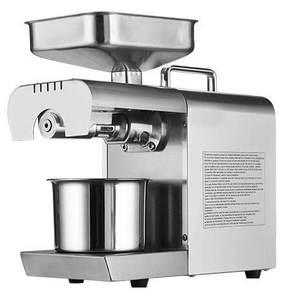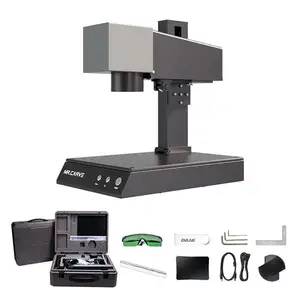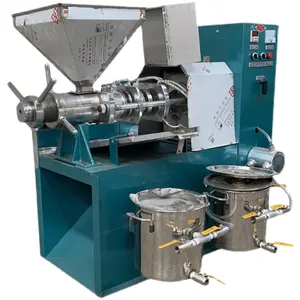Popular in your industry











Related Searches:






















Top categories
About screw press machine
Types of screw press machines
A screw press machine is a type of manufacturing machine that uses a screw drive to apply pressure to compress and remove liquids from materials. There are several types of screw press machines, each designed for specific functions and with different specifications.
- Oil expeller machine: This machine uses a continuous screw press to extract oil from seeds, nuts, and kernels. It is commonly used in the food and agricultural industries to produce edible oils, such as sunflower oil, soybean oil, and peanut oil. Oil expeller machines are typically made of stainless steel or food-grade materials to meet hygiene standards and prevent contamination of the extracted oil.
- Screw juice extractor: This machine is specifically designed to extract juice from fruits and vegetables. It works by crushing the produce and then using a screw press mechanism to separate the juice from the pulp. Screw juice extractors are commonly used in commercial juice production to make fruit juices, vegetable juices, and smoothies. Some screw juice extractors are equipped with interchangeable screens and filters to adjust the extraction process to different types of fruits, vegetables, and desired juice consistencies.
- Dewatering screw press: This machine is designed to separate liquids from solids in sludge, manure, food waste, and other materials. It works by applying continuous pressure through a rotating screw within a cylindrical screen, which pushes the material against the screen, while the liquid passes through the screen, leaving the solid residue behind. Dewatering screw presses are commonly used in wastewater treatment, food processing, and agricultural industries for sludge dewatering, food waste processing, and other solid-liquid separation applications.
These are just a few examples of the many types of screw press machines available. They are widely used in industries such as food, chemical, pharmaceutical, mining, construction, water treatment, and environmental protection, among others.
Specifications and maintenance of screw press machines
The following are some of the specifications and maintenance of the screw press machine for sale:
Specifications
- Production capacity: This refers to the maximum amount of material a screw press machine can process within a specific period. It's usually measured in kilograms or tons per hour. Small machines may have a production capacity of several hundred kilograms per hour, while larger industrial machines can process several tons per hour.
- Power consumption: It is the amount of energy the machine uses during operation. It's usually measured in kilowatts or kilowatt-hours. The power consumption of a screw press machine is determined by the motor size and efficiency. Depending on the application and size, it can vary greatly. For this reason, it is important to select the right screw press machine for the job in order to achieve optimal energy efficiency.
- Pressing pressure: This is the force or pressure exerted by the screw press on the material being processed. It's usually measured in newtons or pounds per square inch. The pressing pressure of a screw press machine can vary depending on the material and the desired output. For example, machines used in oil extraction have different pressing pressure requirements than those used in dewatering.
Maintenance of the screw press machine
- Regular inspection: The machine should be inspected periodically to check for loose parts, excessive wear, or any other issues. It is important to identify and address any potential problems early on to prevent further damage or downtime.
- Lubrication: Proper lubrication ensures the moving parts of the screw press machine are adequately lubricated to reduce friction and wear. The lubrication requirements will depend on the specific type of machine and the manufacturer's recommendations. It is essential to follow the appropriate lubrication schedule and use the right type of lubricant.
- Cleaning: Regular cleaning of the machine is important to remove debris, buildup, or any other contaminants that may cause clogs or damage. The cleaning frequency and methods will vary depending on the application and material being processed.
- Electrical maintenance: The electrical components of the machine should be properly maintained to ensure safe and reliable operation. This involves inspecting electrical connections, cables, and controls, as well as addressing any signs of damage or malfunction.
Scenarios of screw press machines
Screw press machines are widely used in various industries due to their versatility, efficiency, and robustness. Here are some common usage scenarios that can be used as a reference for business buyers.
- In the food industry
In food processing facilities, screw press machines are used to extract oils from ingredients such as seeds, nuts, and fruits. The resulting oil can be used to produce cooking oil, health supplements, or beauty products. In vegetable processing factories, screw press machines can be used to extract juices, purees, or concentrates from fruits and vegetables.
- In the pharmaceutical industry
Pharmaceutical manufacturers use screw press machines to extract active ingredients from medicinal plants or herbs. These machines can also be used for solid-liquid separation and dewatering processes during drug production.
- In the chemical industry
In the chemical industry, screw press machines are used for various processes, including filtration, dewatering, and sludge separation. These machines are crucial for manufacturing chemicals, pigments, fertilizers, and other products. For example, in wastewater treatment plants, screw press machines are used to dewater sewage sludge, reducing the volume of waste and facilitating disposal.
- In the agricultural industry
In the agricultural industry, screw press machines are used for many purposes. For example, in livestock farming, screw presses can be used to process animal feeds by extruding and forming feed pellets. In the production of organic fertilizers, screw press machines can be used to compost and dewater organic materials, resulting in nutrient-rich fertilizer.
- In the construction industry
In the construction industry, screw press machines play an important role in materials recycling. For example, they can be used to extract moisture from excavated soil or construction waste, producing solid bricks or building materials. In addition, screw press machines can also be used in tunneling and ground stabilization projects, such as dewatering to reduce groundwater levels and increase soil stability.
- In the automotive industry
The automotive industry uses screw press machines for various metal forming processes, such as forging, extrusion, and stamping. These machines play a key role in producing automotive components like engine parts, chassis, and body panels.
How to choose screw press machines
- Operating speed:
It is essential to consider the operating speed of the screw press machine to ensure it meets one's production requirements. The pressing rate of the machine, which is usually given in terms of kg/h or t/h, indicates the amount of material that can be processed in one hour. Low-speed screw press machines may be suitable for small-scale production, while high-speed ones are more efficient for large-scale operations.
- Power source:
It is also important to consider the power source of the screw press machine. Electric machines are often used in commercial settings because they provide consistent power and are easy to operate. On the other hand, manual screw press machines are usually suitable for places without electricity or as a backup device. Also, they are labor-intensive and have lower production capacities. Besides, diesel and petrol-powered screw press machines are ideal for applications where electricity is not readily available.
- Material compatibility:
Users should ensure that the selected screw press machine is compatible with the material they need to process. Different types of screw press machines are designed to handle various materials. For example, oil screw press machines are suitable for extracting oil from seeds, while biomass ones are designed for processing organic matter. Also, ensure that the machine's capacity and specifications meet the production needs.
- Durability:
It is important to choose a screw press machine made from durable materials. This ensures the machine can withstand the demanding operating conditions and has a long service life. Also, check for things like stainless steel components that are resistant to corrosion, rust, and abrasion. Such machines can handle regular use and maintenance without premature failure or frequent repairs.
Screw press machine FAQs
Q1: What are the benefits of screw pressing?
A1: The screw press machine provides numerous benefits. It is an affordable and efficient method for separating liquids and solids. Besides, it is easy to operate and maintain. In addition, the machine can be adapted to a wide range of applications and scales.
Q2: What is the working principle of the screw press machine?
A2: The working principle of the screw press machine is to apply high pressure to the material through a screw-driven process, which can be used to dehydrate materials and separate materials.
Q3: What are the applications of the screw press machine?
A3: The screw press machine has a wide range of applications. It can be used to extract juice from fruits and vegetables, separate liquids and solids in industrial processes, dewater sludge and food waste, and more.
Q4: How to choose the appropriate screw press machine?
A4: When choosing the appropriate screw press machine, it is important to consider the following factors: the type and properties of the material to be processed, the desired output quality and efficiency, the scale of the production, and the budget and space availability.





























